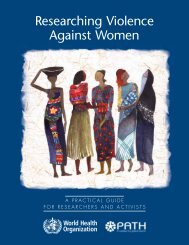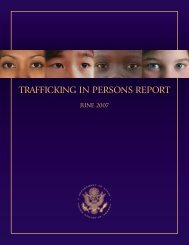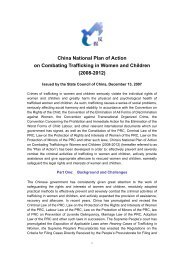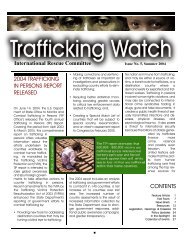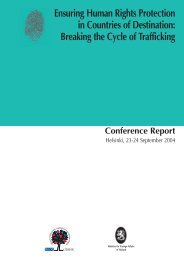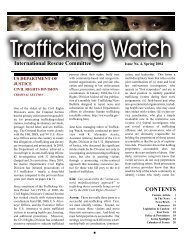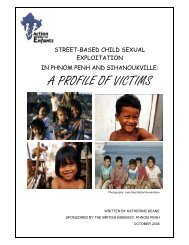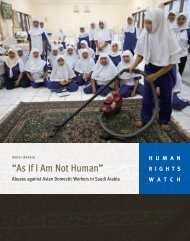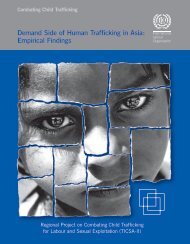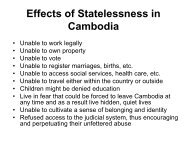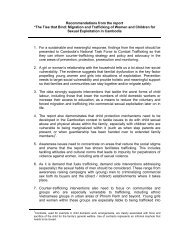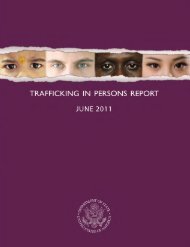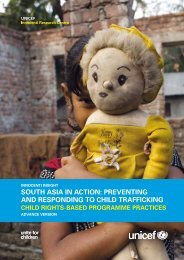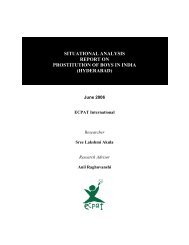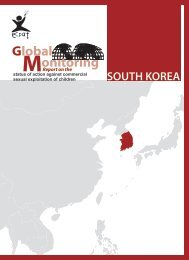Download PDF - Violence Against Children - East Asia and the ...
Download PDF - Violence Against Children - East Asia and the ...
Download PDF - Violence Against Children - East Asia and the ...
You also want an ePaper? Increase the reach of your titles
YUMPU automatically turns print PDFs into web optimized ePapers that Google loves.
Indonesia<br />
Useful approaches to<br />
building child participation in<br />
peace building<br />
Peace building through education<br />
in North Maluku<br />
This innovative project explores new avenues<br />
in peace building through helping war-torn<br />
Muslim <strong>and</strong> Christian communities to focus<br />
on <strong>the</strong>ir children’s education <strong>and</strong> creating safe<br />
communities as a vehicle to foster postconflict<br />
community stabilisation. Approved<br />
for funding in late 2001 by a foreign<br />
government donor <strong>and</strong> supported by private<br />
donors, <strong>the</strong> project has three main<br />
components:<br />
• providing transitional education support for<br />
IDP children (uniforms, books, supplies,<br />
teacher support) <strong>and</strong> forming education<br />
committees in IDP communities<br />
• providing support for a trauma healing <strong>and</strong><br />
creative activities program, <strong>and</strong><br />
• facilitating a community communication<br />
forum where conflict management skills<br />
will be introduced in <strong>the</strong> context of<br />
community discussion groups.<br />
A fund for a “peace project” in each of <strong>the</strong><br />
21 communities to be targeted will help <strong>the</strong>m<br />
to track <strong>and</strong> celebrate <strong>the</strong>ir own progress<br />
toward peace.<br />
World Vision collaborates with UNICEF<br />
<strong>and</strong> Save <strong>the</strong> <strong>Children</strong> UK in providing <strong>the</strong><br />
education supplies <strong>and</strong> training for teachers<br />
<strong>and</strong> trauma support workers.<br />
The Peace <strong>and</strong> Tolerance Magazine<br />
project: A child-focused peace<br />
education initiative in North<br />
Maluku<br />
The aim of <strong>the</strong> Peace <strong>and</strong> Tolerance Magazine<br />
project is to nurture peace attitudes <strong>and</strong> skills<br />
among war-affected school children in grades<br />
4–6, <strong>and</strong> through <strong>the</strong> magazine – plus a<br />
teacher’s supplement – to provide training,<br />
curriculum <strong>and</strong> classroom activities for<br />
students <strong>and</strong> teachers to develop conflict<br />
management skills. It is assumed that <strong>the</strong><br />
magazine will circulate throughout <strong>the</strong><br />
community, <strong>and</strong> that teachers (as community<br />
leaders) will develop capacities to influence<br />
community conflict transformation processes.<br />
The project will produce a 15-edition<br />
curriculum over three years <strong>and</strong> will directly<br />
target 10,500 school children <strong>and</strong> 350<br />
teachers (130 to be intensively trained) in<br />
115 schools in North Maluku. The three main<br />
activities are:<br />
• produce <strong>the</strong> magazine<br />
• train teachers in its use, <strong>and</strong><br />
• provide follow-up support, including a midterm<br />
teachers’ conference.<br />
Under <strong>the</strong> leadership of <strong>the</strong> World Vision<br />
project manager, a full-colour prototype of<br />
<strong>the</strong> magazine called Harmonis has already<br />
been developed <strong>and</strong> tested in Ambon, in<br />
cooperation with <strong>the</strong> Salawaku Foundation,<br />
which partnered with World Vision in a<br />
completed alternative education project<br />
<strong>the</strong>re. The field test generated a high level of<br />
enthusiasm for, <strong>and</strong> interest in, <strong>the</strong> magazine.<br />
This project is designed to link directly with<br />
<strong>the</strong> Peace Building Through Education in<br />
North Maluku project, <strong>and</strong> will be a fur<strong>the</strong>r<br />
component in World Vision’s mutual<br />
collaboration with Save <strong>the</strong> <strong>Children</strong>.<br />
Programs in o<strong>the</strong>r contexts that reduce<br />
risks to children in areas of conflict by<br />
actively engaging with issues of reconciliation<br />
<strong>and</strong> development can learn from Indonesia’s<br />
experience. Lessons include:<br />
1. Effective “special” projects with a peace<br />
building purpose can be incorporated into<br />
existing community work without high<br />
costs when designed with long-term<br />
strategy <strong>and</strong> low overheads in mind.<br />
2. Community development project designs<br />
have <strong>the</strong> capacity to support peace<br />
building processes that lead to increased<br />
trust <strong>and</strong> a reduction of violence.<br />
3. Physical “connecting” projects, such as<br />
road building, enhanced with peace<br />
55



